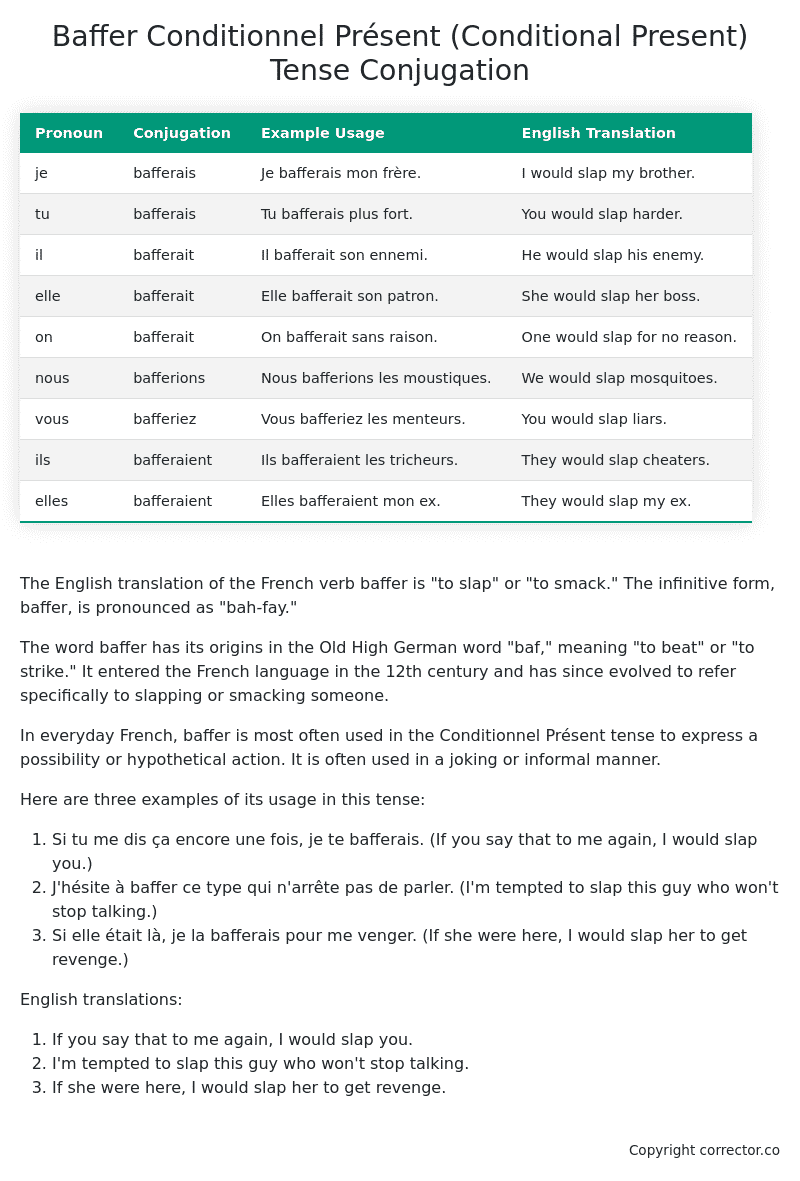Conditionnel Présent (Conditional Present) Tense Conjugation of the French Verb baffer
Introduction to the verb baffer
The English translation of the French verb baffer is “to slap” or “to smack.” The infinitive form, baffer, is pronounced as “bah-fay.”
The word baffer has its origins in the Old High German word “baf,” meaning “to beat” or “to strike.” It entered the French language in the 12th century and has since evolved to refer specifically to slapping or smacking someone.
In everyday French, baffer is most often used in the Conditionnel Présent tense to express a possibility or hypothetical action. It is often used in a joking or informal manner.
Here are three examples of its usage in this tense:
- Si tu me dis ça encore une fois, je te bafferais. (If you say that to me again, I would slap you.)
- J’hésite à baffer ce type qui n’arrête pas de parler. (I’m tempted to slap this guy who won’t stop talking.)
- Si elle était là, je la bafferais pour me venger. (If she were here, I would slap her to get revenge.)
English translations:
- If you say that to me again, I would slap you.
- I’m tempted to slap this guy who won’t stop talking.
- If she were here, I would slap her to get revenge.
Table of the Conditionnel Présent (Conditional Present) Tense Conjugation of baffer
| Pronoun | Conjugation | Example Usage | English Translation |
|---|---|---|---|
| je | bafferais | Je bafferais mon frère. | I would slap my brother. |
| tu | bafferais | Tu bafferais plus fort. | You would slap harder. |
| il | bafferait | Il bafferait son ennemi. | He would slap his enemy. |
| elle | bafferait | Elle bafferait son patron. | She would slap her boss. |
| on | bafferait | On bafferait sans raison. | One would slap for no reason. |
| nous | bafferions | Nous bafferions les moustiques. | We would slap mosquitoes. |
| vous | bafferiez | Vous bafferiez les menteurs. | You would slap liars. |
| ils | bafferaient | Ils bafferaient les tricheurs. | They would slap cheaters. |
| elles | bafferaient | Elles bafferaient mon ex. | They would slap my ex. |
Other Conjugations for Baffer.
Le Present (Present Tense) Conjugation of the French Verb baffer
Imparfait (Imperfect) Tense Conjugation of the French Verb baffer
Passé Simple (Simple Past) Tense Conjugation of the French Verb baffer
Passé Composé (Present Perfect) Tense Conjugation of the French Verb baffer
Futur Simple (Simple Future) Tense Conjugation of the French Verb baffer
Futur Proche (Near Future) Tense Conjugation of the French Verb baffer
Plus-que-parfait (Pluperfect) Tense Conjugation of the French Verb baffer
Passé Antérieur (Past Anterior) Tense Conjugation of the French Verb baffer
Futur Antérieur (Future Anterior) Tense Conjugation of the French Verb baffer
Subjonctif Présent (Subjunctive Present) Tense Conjugation of the French Verb baffer
Subjonctif Passé (Subjunctive Past) Tense Conjugation of the French Verb baffer
Subjonctif Imparfait (Subjunctive Imperfect) Tense Conjugation of the French Verb baffer
Subjonctif Plus-que-parfait (Subjunctive Pluperfect) Tense Conjugation of the French Verb baffer
Conditionnel Présent (Conditional Present) Tense Conjugation of the French Verb baffer (this article)
Conditionnel Passé (Conditional Past) Tense Conjugation of the French Verb baffer
L’impératif Présent (Imperative Present) Tense Conjugation of the French Verb baffer
L’infinitif Présent (Infinitive Present) Tense Conjugation of the French Verb baffer
Struggling with French verbs or the language in general? Why not use our free French Grammar Checker – no registration required!
Get a FREE Download Study Sheet of this Conjugation 🔥
Simply right click the image below, click “save image” and get your free reference for the baffer Conditionnel Présent tense conjugation!

Baffer – About the French Conditionnel Présent (Conditional Present) Tense
Formation
Common Everyday Usage Patterns
Expressing Polite Requests
Expressing Hypothetical Situations
Expressing Doubt or Uncertainty
Interactions with Other Tenses
Present Tense
Past Tense
Future Tense
Conditional Perfect
Summary
Want More?
I hope you enjoyed this article on the verb baffer. Still in a learning mood? Check out another TOTALLY random French verb conjugation!


